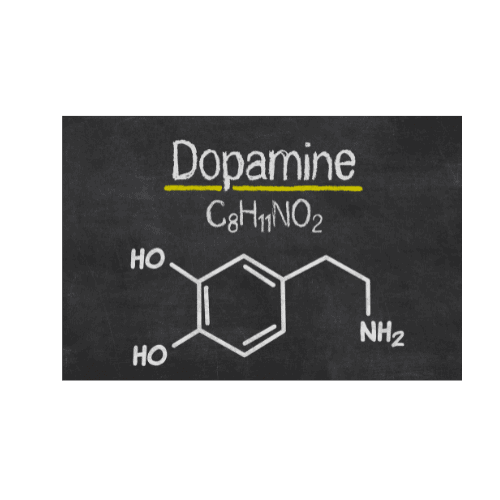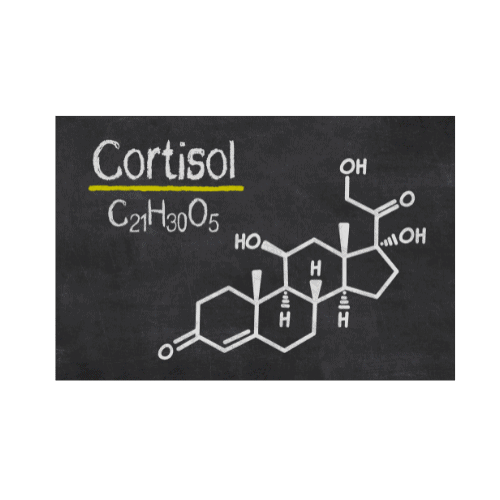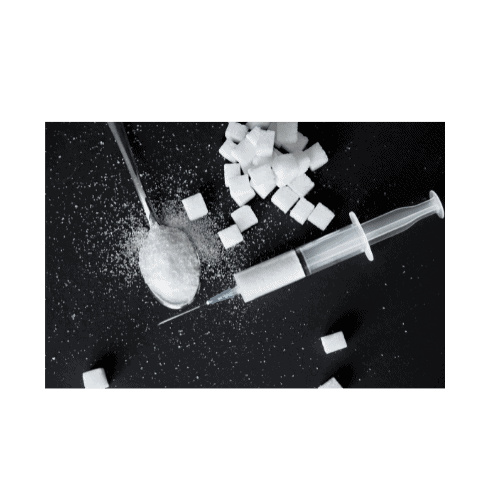Sugar Addiction or Sugar Habit?
A friend and I were recently chatting post-gym workout about our mutual love of vegetables, kombucha, peanut butter, chia seeds (you know, all the good stuff).
In addition to the “healthy” foods, we both also love an occasional chocolate treat, especially vegan brownies. I mean, c’mon, just because we love vegetables doesn’t mean we can’t love chocolate too!
During our conversation, she mentioned something that inspired me to write this article. She said she thinks that sugar is addicting. Not just in the figurative sense, but she meant in a biological sense, and it really made me want to investigate further.
High sugar intake is a big problem in our society, and it is a result of how our mammal brains were created in order to survive.
But is it an addiction or is it just a sugar habit?
Read on and you’ll learn all you need to know about why we crave sugar, if it’s a habit or an addiction, and what to do to eat less sugar.
The Hormonal Brain
You may have heard me mention dopamine before.
Dopamine is a neurotransmitter, or hormone, that plays a large role in the survival of all mammals. It is a chemical that is controlled by our brain’s limbic system which is made up of multiple parts. These parts include the pituitary gland, hippocampus, amygdala and hypothalamus.
There is another part of the brain involved in habit formation called the cortex. The cortex has a neat skill of storing and recognizing patterns created by our hormones. This comes into play with habits. The cortex can also override the limbic system and “keep it in check” if it feels it needs to.
Some mammals have a small cortex, while others like us humans, have large ones. The cortex gives us some control over how we react to the release of hormones like dopamine.
The cortex is what helps differentiate a human being from other non-primate mammals. The difference is our ability to make more deliberate decisions and not just act on hormones.
- Reference: Habits of a Happy Brain by Loretta Graziano Breuning, PhD
The Role of Dopamine in Habits
Dopamine is released when we find something we need or want. This was crucial back in the day when our ancestors didn’t have grocery stores, heated homes, running water, etc. Dopamine was necessary for survival.
Since dopamine gets released when we find something we need or want, it was released when our ancestors found things they needed for survival. This might include berries, an animal to hunt for meat, or a cave to serve as shelter.

When something was found, the brain released a small amount of dopamine, which caused a feeling of joy or pleasure. This feeling then served as a motivator to keep finding things for survival. This was simply because it felt great and was a “reward” for finding what was needed.
There’s been discovery of dopamine playing a part in drug addiction . So, although sugar addiction isn’t nearly as harmful as drug addiction, they both may share that “dopamine hit.”
Part of the reason why it would feel great, is because it would counterbalance another hormone called cortisol. I like to think of cortisol as the “discomfort hormone.”
The Role of Cortisol in Habits
Cortisol increases during times of stress, anxiety, hunger, pain, excessive cold or heat, fear, all the unpleasant things. Mammals will do almost anything to decrease discomfort, meaning tamp that cortisol level back down where it belongs.

The biological way to do this is to increase the hormones that counterbalance cortisol, one of which is dopamine. (There are three others, which are serotonin, oxytocin, and endorphin, but I’ll talk about those in a future article.
As you now know, the way to increase dopamine is to find something you need or want that brings you pleasure. This is strongly
The Dopamine/Cortisol Cycle
To sum it up, whenever Cave Man Cameron was hungry, his cortisol levels became elevated. When he found berries to eat or a deer to hunt, dopamine was released by his limbic system.
This increase in dopamine then caused a decrease in cortisol levels and produced a feeling of pleasure from the reward of finding the berries.
This pattern was programmed into the cortex. This enabled him to anticipate this same response if he found and ate berries again. This essentially led to the behavior, or habit, of eating when hungry.
This same process occurs in habit formation in all areas, not just with food. It occurs in any situation where cortisol is causing a feeling of discomfort.
It then leads to the desire to decrease that discomfort (cortisol). This occurs by increasing dopamine (or another hormone such as serotonin, oxytocin, or endorphin). Dopamine is a major player in a significant percentage of our habits though, and definitely with sugar.
- Read this too: Should You Break Your Habit of Snacking at Night?
- GET WEEKLY TIPS: Eating Habit and Weight Loss Tips
Sugar Break-Down
Sugar is somewhat of a broad term, so let’s break it down. There are two main types of sugar.
One of which is unprocessed (unrefined) sugars from whole foods, such as the sugar found in strawberries, grapes, beets, carrots, corn, etc. The sugar in these foods is termed, fructose. Dairy also contains unprocessed sugar, termed lactose.
The other type of sugar is processed (refined) sugars. These are found in candy, desserts, soda, ketchup, barbecue sauce, most juices, etc. This sugar is called sucrose, which is made by processing sugar cane and sugar beets.
Another type of processed sugar is high-fructose corn syrup (from corn obviously!). Despite these sugars being originally from corn, they are absorbed differently in our bodies since they are altered.
- Reference: Harvard.edu
The Effect of Unprocessed Vs. Processed Sugars on Dopamine
When you eat a handful of strawberries, you are also eating the fiber and nutrients that are in the fruit along with the fructose. Fiber helps you feel full, so can prevent overeating.
- Related and Skim-Worthy: 5 Brain Hacks to End Overeating
Your body needs nutrients, so your brain is satisfied with the nutrition from the fruit. This also helps to keep you feeling fuller, longer.
When you eat a piece of chocolate cake, the sugar and flour are processed and therefore very fine. They are absorbed into the bloodstream faster than they would in their whole food form.

This in turn elevates blood sugar levels quickly, causing a large release of dopamine by the limbic system. What goes up must then come down, and the dopamine no longer is counterbalancing the discomfort of cortisol.
The uncomfortable feeling of cortisol causes another spike in dopamine in order to try to counteract the uncomfortable feeling of cortisol. This starts the recognition pattern of the cortex and leads wanting to find sugar to cause a spike in dopamine again, forming a habit.
When this cycle occurs and repeats itself multiple times, it becomes strengthened, which contributes to the habit cycle.
The term “addiction” is “a strong inclination to do, use, or indulge in something repeatedly,” according to the Merriam Webster Dictionary. Of course this sounds like what a habit is, right? So you can see the confusion between the two terms.
Typically, addiction results in (oftentimes severe) physical withdrawal symptoms, unlike habits, when a person goes without the substance.
Therefore, although your sugar habit may seem like an addiction, it shouldn’t be classified as such.
How to Weaken Your Sugar Habit
So, as you can see, sugar can be very habit-forming. However, it is more processed sugar, rather than natural sugars that are likely to produce the habit.
Next time you are feeling nervous, upset or stressed, take a short walk, a few deep breaths, or call a friend. Activities like this will help decrease the cortisol, without significantly strengthening the dopamine-cortisol cycle.
If you are someone who always reaches for the cookies, candy, etc., then the above suggestions may be too far of a reach to start with.
What I would suggest then would be to make some fruit readily available, so you can grab that instead of the processed sugars. Your brain still experiences the dopamine hit, but it is a much smaller spike.
Therefore, you won’t feel as much of the negative effect of cortisol when it levels out. The habit of associating sugar with stress or anxiety relief will start to weaken, and your brain will start to crave it less.
- Related and Skim-Worthy! How Stress Can Make You Fat, Bald, and Ugly (Not ugly as in ugly, but as in mean and irritable)
Final Notes
Although sugar isn’t exactly a healthy choice, I don’t recommend that you completely deprive yourself of anything sweet and yummy.
Still treat yourself to homemade chocolate chip cookies, cake on your birthday, and apple cider donuts in autumn. I just wanted you to understand why your brain craves it and that it is possible to weaken that craving or habit.

KATE JOHNSTON
Certified Habit Coach, PA-C
If you’re a career woman struggling with the frustrations of bad eating habits, you’re in the right place. You can finally feel in-control around food, and with your body and health.
Next steps: Book your free consultation below. I’ll listen and provide a custom plan. If you like it, we’ll execute it together.
